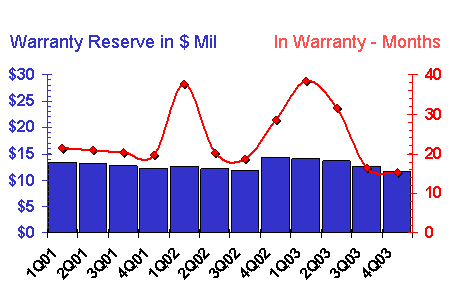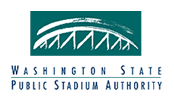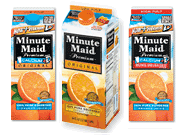February 17, 2004 |
ISSN 1550-9214 |
Stadium Warranties:Like any other large construction project, sports stadiums come with product warranties. Just because there's no warranty registration card in the box doesn't mean that the builders don't face warranty claims from stadium owners. Two examples follow, from Seattle and Houston.One reason product warranties might not be commonly associated with sports stadiums is the fact that most of the buildings are so old that they're now well past their warranty periods. But in the past decade numerous U.S. cities have opened new baseball and/or football stadiums. Some cities, such as Philadelphia, Pittsburgh, and Houston, have opened one of each, replacing older dual-use stadiums. Seattle and Detroit opened new football stadiums in 2002. Cincinnati opened a new baseball stadium in 2003. Each of these new buildings came with a warranty. In at least two of these cases, the builders also faced warranty claims. With consumer electronics items, legend is that if the product works out of the box it will work fine throughout its one-year or 90-day warranty period. With stadium construction projects, however, it takes a full season or longer to find and fix all the warranty jobs, particularly those that are weather-related such as leaks. Fixing a HoleIn Seattle, for instance, Seahawks Stadium opened in July 2002, the first of five months in a row where the precipitation was below normal. According to the National Climatic Data Center, the winter of 2002-03 in Seattle was closer to the long-term average, but the spring and summer were once again slightly below average. Then the heavens opened. October 2003 was one of the wettest months on record and Oct. 21, 2003 was the city's rainiest day ever. The winter now ending will be remembered as one of Seattle's wettest.
Brian Surratt, public affairs manager for First & Goal Inc., said the leaking seems to be confined to that one specific area around the north tower. "There are no leaks in the public areas," he said. There are roofs overhanging most of the seats on both the east and west sides of the stadium, but they're apparently not leaking. Rather, the leaks seem to be on the north end of the stadium along the stairs. "And actually, our First & Goal offices are experiencing the leaks," he said. The winter of 2002-03 was somewhat milder and dryer than normal, so it wasn't such a good test of the weatherproofing membranes, Surratt said. "This current winter is a pretty rough one for us, with a lot of rain. This helped diagnose some of the problems." Surratt said First & Goal is now working with Turner Construction to find and fix all the leaks before the summer. "We've been working with them for quite a while now, them and the [Washington State] Public Stadium Authority, who are the official owners of the stadium, to get these issues resolved. The warranty expires later on this year, and we will get it fixed before that time," he said. The stadium was constructed using a novel mix of public and private funds. In 1997, Seattle-area residents agreed to pay a fixed $300 million for the stadium, and not a penny more. Team owner Paul Allen, who also owns the Portland Trail Blazers basketball team and is perhaps better known as a co-founder of Microsoft Corp., agreed to pay the rest -- an amount which eventually topped $130 million. First & Goal operates the stadium, but the Public Stadium Authority is the official owner. Tom Gerlach, senior vice president and general manager of Turner Construction's Seattle office, said the builder issued a blanket one-year warranty to First & Goal, the building's developer and operator, with some longer warranties for specific systems such as roofs. First & Goal, meanwhile, issued a blanket two-year warranty to the owners of the building, the Washington State Public Stadium Authority. One-year general warranties from the builder are typical for commercial and institutional building projects, he said. "All the warranties are still in place and the work is proceeding," Gerlach said. "All the teamwork that got us to the point where we had all the success with the main contract is still in place, and we're working with the architect and the developer to make sure that we fix these to everybody's satisfaction." Gerlach said with buildings of this size, warranties are always agreed upon well in advance, and are written into the contracts. "All you have to do is administer them correctly, and you'll have a good outcome." A Jan. 30 article in the Seattle Times placed the cost of fixing the leaks at approximately $100,000. Gerlach declined to comment upon the final pricetag, but said it was not a substantial amount in a project of this size. "It's relatively minor, but nobody likes to have an operating building that has any leaks in it," Gerlach said. "The building has behaved beautifully, and there are a couple of areas -- as with any big building -- that need attention during the warranty period." Super Bowl Cleanup
What was remarkable about the stadium was its roof, which could be opened or closed in 20 minutes as weather demanded. The Astros had played indoors at the Astrodome from 1965 to 1999, so they were accustomed to having a weather shield at their disposal. But this roof also could be opened wide on clear days, allowing wind and sun to have their effect on the game. The $30 million retractable roof works fine. The problem was a discoloration of the roof's PVC membrane, which some said made it look like a moldy old shower curtain. Though the stains were probably caused by the interaction of Houston's heat, humidity, and air pollution, it probably wouldn't have happened if the roof had been periodically cleaned by the stadium's owners, the Harris County-Houston Sports Authority, or its tenants, the Houston Astros. But neither party had ever done so, believing that the dirt would wash off naturally in the rain. Jerry Dinkins, director of facilities for the Harris County-Houston Sports Authority, said portions of the roof turned black, while other parts turned yellow. "It was very unsightly," he said. It certainly was no longer its original white color. Something had to be done. With Houston's turn to host the Super Bowl approaching, somebody had to clean the stains off the roof before all the VIPs came to town. GenFlex Roofing Systems, a division of Omnova Solutions Inc., had installed the roofing membrane and provided the stadium owners with a 10-year warranty. Tom Kaufman, engineering services manager at GenFlex, was called in to troubleshoot the problem. "I was up on top of it," he told Warranty Week. Kaufman suggested that the discoloration was caused by a combination of the hot, humid climate and the air pollution problems in Houston. "I'm not a chemist, but the dirt collects on the roof and then the microorganisms eat the dirt," he said. "It's common in high humidity areas." All agreed there was a problem. All agreed that a cleaning was the best short-term solution. But who would pay for the cleaning? Dinkins said he thought GenFlex should pay. "We went to the roofing manufacturer and said we think this is under warranty," he said. GenFlex disagreed with that view, saying that the problem was a lack of maintenance, not a defect in the product. Dinkins said the problem wasn't the dirt; it was the bacteria. "I don't think I would use the word 'defective,'" Dinkins said. "We looked at the specifications, and the way we read it was that there should be a bactericide in the composition of the PVC that would inhibit growth of anything. We talked to GenFlex and said this doesn't appear to be happening. There is growth." Dinkins said the Sports Authority hired a testing lab to come test the roof, to see what was causing the stains. Those tests confirmed that the cause was bacteria. "So we got back with him and said we think the warranty guarantees that no bacteria would grow on it," Dinkins said. "He still disagreed, but he agreed that he would go ahead and clean it for us before the Super Bowl, and then we would address what we would do with it after that." GenFlex hired Ken Barlow Cleaning Systems to scrub the stains off the PVC membrane, and paid the bill for a roof cleaning that took place in mid-January, a few weeks before Super Bowl XXXVIII was played in nearby Reliant Stadium. "They did an excellent job," Dinkins said. "They have been very co-operative." That took care of the immediate problem. Next, he said, the parties have to agree on how to prevent it from happening again. The long-term choices, Dinkins said, are for GenFlex to either install an acrylic overlay on the PVC membrane, or another single-ply layer on top of the existing layer. GenFlex said all that's needed is an occasional washing. Warranty Claims and AccrualsGenFlex doesn't disclose its warranty expenditures publicly, but fortunately the parent company does. Omnova manufactures everything from wall coverings to chemicals used in the production of specialty papers. But the only line of business carrying product warranties is the roofing segment. Therefore, Omnova's warranty reports are more or less the same as GenFlex Roofing Systems' warranty reports. As the chart below illustrates, Omnova's warranty reserve fund balance has been rather stable for the past three years. It's been as high as $14.3 million and as low as $11.7 million, but it hasn't changed by very much from one quarter to the next. We should note that figures for only the most recent eight quarters are derived from Omnova data. The figures for 2001 are estimates derived from breaking up an annual figure supplied by Omnova into four equal parts. Omnova Solutions Inc.
Warranty Reserves, 2001-2003  The red line in the above chart tracks the capacity of the company's reserve fund, expressed as the number of months the funds would last given the current amount spent per month honoring claims. Long term, the ratio has remained within a range of 15 to 20 warranty-months, meaning that the company keeps in reserve an amount equal to 15-20 months' worth of claims. There were, however, two noticeable spikes: in the first quarter of 2002 and again in the first quarter of 2003. Ironically, this was caused by a fall in the amount of claims during those periods, as will be seen in the next chart. While Omnova spent roughly $2 million in most quarters to satisfy warranty claims, in both first quarters the amount spent plummeted to just above $1 million. In percentage terms, warranty claims fell from roughly 6% to 7% of product revenue to under 5% during those quarters. The accrual rate, meanwhile, remained mostly between 5% and 6% of sales except for a sudden spike to over 18% towards the end of 2002. Omnova Solutions Inc.
Warranty Claims & Accruals, 2001-2003  Warranty Week requested some assistance from Omnova to explain these fluctuations in warranty claims and accruals, but that request was declined. The company did agree, however, to fact-check at least the 2002-2003 figures for accuracy. Postscript to "Turf Warranties"Numerous readers responded to the Feb. 10 article on artificial turf in major league sports stadiums. The most shocking response of all came on Friday the 13th, when SRI Sports Inc., also known as Southwest Recreational Industries Inc., filed for bankruptcy protection from its creditors. No specific reason was cited in documents filed with the U.S. Bankruptcy Court for the Northern District of Georgia (home of SRI's manufacturing plant). SRI's Chapter 11 case will be handled by Matthew Levin of Alston & Bird LLP, an Atlanta-based law firm. The filing listed assets of $102 million and debts of $88 million. The list of creditors was topped by Blackstone Mezzanine Partners LP, part of the venture capital firm Blackstone Group; Martin Surfacing Inc., part of Armstrong World Industries Inc.; and GE Capital Corp., part of General Electric Co. Blackstone was owed $19.6 million, Armstrong was owed $6.3 million, and GE Capital was owed $3.3 million. The debts to Blackstone and GE Capital were listed as senior subordinated notes due in 2008, carrying an interest rate of 15% and payable quarterly. The debt to Armstrong, itself in Chapter 11 bankruptcy proceedings, was the only one listed as being in dispute.
A reader in Asia wrote in to explain that sunlight fades and degrades artificial turf, and is a limiting factor keeping product warranties under eight years in some parts of the world. He also noted that SRI acquired rights to the AstroTurf brand name in 1994 only after the former manufacturer collapsed in a financial scandal that earned several European executives a multi-year stay in prison. We didn't know about the sunlight effect, but we knew about the scandal. The reason it wasn't mentioned in the Feb. 10 article is because it happened ten years ago to another company in another country, and had nothing to do with the way SRI Sports treats its current customers and creditors. Mentioning it in an article about warranty litigation would have been what the lawyers would call prejudicial. Metrodome Upgrade Affected?
One reader who insisted that he didn't tell us, told us that SRI Sports was in fact beginning a process with this filing that would end with either a sale or an orderly shut-down of the company. So it's a Chapter 11 reorganization in name only. It's really a liquidation. All but 190 of the company's 510 employees have been let go, and its manufacturing operations have ceased. The focus now is to complete all projects now under way and collect the payments. Subsidiaries such as American Athletic Inc. and Sport Court Inc. are still being packaged for sale, but SRI Sports itself is shutting down for good. The future of SRI's product warranties also is uncertain. In any Chapter 11 bankruptcy reorganization, the question of which bills get paid always is left up to the judge assigned to the case to decide. Warranty holders with claims to make are given no special status among such a company's creditors. Assuming the company re-emerges from bankruptcy, those claims should get paid. But if this instead turns into a liquidation proceeding, the warranties disappear with the company that issued them. The only pro stadiums with SRI-made fields less than eight years old, however, are in Buffalo (Ralph Wilson Stadium) and Philadelphia (Veterans Stadium). Speaking of Veterans Stadium, a Philadelphia sports fan wanted to make sure it was understood that both that city's home teams have now left that venue and its much-maligned artificial surface behind. The Eagles completed the most recent football season in Lincoln Financial Field, while the Phillies will open the 2004 baseball season this April in a new facility called Citizens Bank Park. Both fields are made of grass. Enhanced GrassA Pittsburgh sports fan wrote to say that Heinz Field, home of the Steelers, had just completed its football season on a hybrid surface that combines natural grass with artificial fibers woven into the ground to lend strength to the sod. After two seasons spent trying to keep the grass alive -- mostly in vain -- stadium management brought in a Belgian company named Desso DLW Sports Systems NV, which since 1999 has been part of Armstrong World Industries. The reader reports that this past season, the grass remained in much better shape than in the previous two seasons. For American football, Desso DLW installs a reinforced natural grass surface called DD GrassMaster, which it has done not only for the Pittsburgh Steelers, but also for the Denver Broncos (Invesco Field) and the Philadelphia Eagles (Lincoln Financial Field). Otherwise, most of its work is done in Europe on fields used for that other football, also known as soccer. Another reader protested that M&T Bank Stadium, home of the Baltimore Ravens, switched from natural grass to an artificial surface last summer. The new Momentum Turf System surface, manufactured by a Canadian company called Sportexe, also is used by the University of Southern Mississippi and the University of California at Berkeley. Yet another reader suggested that the Pro Bowl, played annually in Hawaii after the regular season ends, should be considered an NFL event. For that reason, the reader said the Aloha Bowl should be considered an NFL stadium, although for the rest of the year it is used by the University of Hawaii and other local teams. So let's assume, for a moment, that Aloha Stadium is the 32nd NFL stadium (one stadium is shared by two of the 32 NFL teams). Aloha uses FieldTurf, having replaced its AstroTurf surface last year. CorrectionFinally, Warranty Week must correct a statement made in the Feb. 10 article that the only non-grass, non-FieldTurf, and non-SRI Sports field in use in a professional baseball or football stadium was in Dallas, where the Cowboys use the RealGrass surface made by Sportfield LLC. There actually are two: RealGrass in Dallas and Momentum in Baltimore. Of the 14 other artificial fields used for football or baseball, six are provided by SRI Sports, seven are provided by FieldTurf, and one (Olympic Stadium, home of the Montreal Expos) is now ripping out an SRI surface and changing over to FieldTurf. If this is all very confusing, readers will be happy to hear that a chart of all the artificial turf installations was added to the Feb. 10 article on the suggestion of yet another reader. For those keeping score, of the 32 NFL playing fields (including Aloha Stadium), 13 use artificial turf and 19 use real grass. In baseball, assuming all goes according to plan for the Phillies, Twins, and Expos at their home openers, there will be 26 MLB teams on grass and four on artificial turf during the 2004 season. | |||||||||||||||||||||||||||||||||||||||||||||||
| |||||||||||||||||||||||||||||||||||||||||||||||



 In Houston,
In Houston, 





